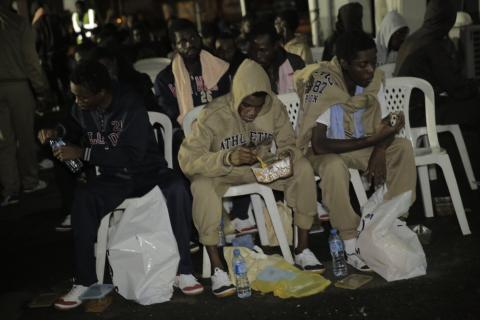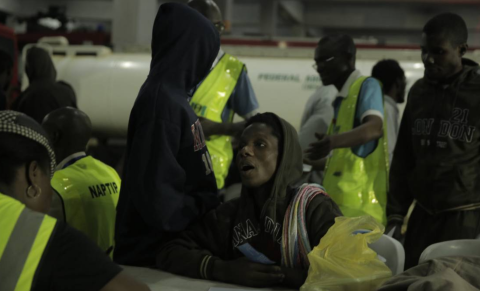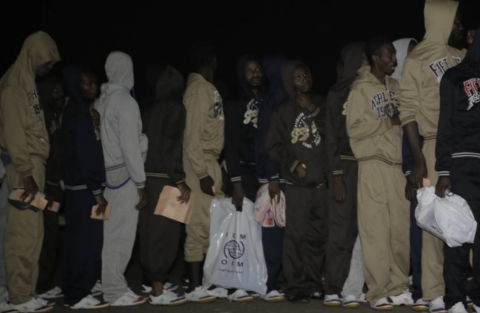They were mocking my husband that he came back with nothing after all the years he had been in Libya and that he only returned with a pregnant wife. Life is so hard; it is very hard.
It was a slow business day for Sunday Joy on April 15. She had not sold much despite staying back at the shop until dusk. When she finally convinced herself that it was another “dry” business day and it was time to go home, two men drove to her shop to buy bags and cartons of foodstuff. She would later sell N182,000 worth of food items. Her heart leapt for joy.
She counted the money, tucked them into her bag and hurriedly locked her shop to go home. At home, she brought out the wads of cash to show her husband how much she sold only to realise she was paid with counterfeit money. The joy evaporated from her face.
“Everything was fake,” she told SaharaReporters. “Not a single note out of N182,000 was real. I did not know what to do. I called my friend that IOM trained us together and was just crying.”
Joy is one of the Libya returnees rescued by the International Organization for Migration (IOM), a United Nations intergovernmental organization that provides immigration services to migrants. Since her deportation back to Nigeria, resettling in the country for a new life has been difficult. She has had to grapple with family and societal stigmatization. The harsh economic condition that drove her towards the red sea has worsened.
The high rate of unemployment drove many Nigerians like Joy out Libya to find economic prosperity. According to the data from the Nigerian Bureau of Statistics, the unemployment rate has continued to rise since 2016 and it currently stands as 23.1% of the working population.
This ever-growing rate is one of the push factors sending thousands of Nigerians on the dangerous journey across the desert and the Mediterranean Sea. Those who could not legally migrate to seek jobs, resort to this dangerous illegality.
Slavery to penury
Joy had travelled to Libya to cross to Italy. She arrived in Khartoum after weeks in the desert, only to be abandoned by her ‘master’, the title she used to refer to the woman who had promised to help her cross to Italy. She was sold into slavery thereafter. According to her, a Benin man bought her for an equivalent of N250,000 ($695).
Fellow Africans are both perpetrators and victims of the slave trade. They extort and hold captives desperate immigrants plying the Sahara Desert. In many cases, they torture them and send agonizing videos to their family members back home.
Joy was a slave for a year in Libya. “From Khartoum, I was taken to Misrata,” she told SaharaReporters. “I was based in Misrata, then someone bought me. A Benin guy bought me for N250,000 and said I would pay him N750,00. He gave me three options. He said there were three types of jobs in Libya: prostitution, house care and hospital job where one would be paid monthly.
“I started working at the hospital. I paid him in 12 months. For the one year, I suffered for him. I did not eat while going to work. I only got food from some Libyan women at the hospital. No one should go through that experience. After paying his money, he said it was time for me to leave his house because he wanted to buy someone else.”
Joy worked for a year as a hospital attendant to pay her slave master and regain freedom. But freedom was not cheap. She had no money to rent an apartment neither did she have a relative in Libya. She was again stranded; this time, with no master. A flicker of hope, however, shined on her when she found Sunday David, who was a comfortable auto mechanic in Misrata, on social media.

She would later move in with David who saved money for both of them to cross the sea over to Europe. They failed. The coast guard arrested them, held them in a detention camp and thereafter, deported them back to Nigeria.
With an eight-month-old baby, a collapsed business and a struggling husband, life has never been bleaker. When she was in Libya, although deadly, life held hope. She had hope that one day, she would cross the Mediterranean Sea into Europe, where life even as a beggar was said to be better.
“It has been tough,” she lamented. “When I came back, I wanted to abort this child because it was too tough. We did not come back with anything but my husband said I should not abort the child. He said I should go back to his parents’ house in Ogun state.
“At his parents’ house, people were mocking us. They were mocking my husband that he came back with nothing after all the years he had been in Libya and he only returned with a pregnant wife. Life was so hard; it was very hard.”
Her husband was one of the returnees funded by the IOM after the completion of four-day training. David got about N500,000 to start his business. He was able to rent an apartment in Lagos and soon after, Joy joined him.
Joy also received a start-up capital in January 2019 to start up a business, selling bags and cartons of food items. Life seemed to be taking shape until the night of April 15 when she sold out her goods for wads of fake naira notes.
“Ever since then, I have not opened the shop. I am not doing anything now because I did not learn any handwork before I left Nigeria,” Joy lamented.
Back but broken

Family rejection, financial struggle, and stigmatization capture the story of many returnees, like Joy, who are disoriented after returning home. Not less than 8,657 Nigerians were deported from Libya between May 2017 and August 2018, according to the National Emergency Management Agency (NEMA). As of May 2019, IOM said 356 people died in the Mediterranean Sea. This figure does not include those who never made it to Libya. “Dead bodies were everywhere in the desert. People were just dying,” Kunne David, who went on the journey with two infants, told SaharaReporters.
Prince Olumese, who had once taken the deadly journey, said many of the returnees resorted to criminal and immoral activities for survival. Olumese and his wife had planned to cross to Italy through the Northern African country but their plan was scuttled when they were deported back home penniless. He said while on the journey, he saw unimaginable things that he “would not wish on even his worse enemies”.
Olumese, who now champions advocacy about illegal migration, said many returnees still have to grapple with debt incurred for travel to Libya and ransom when they were held in captivity.
“Those who gave them money when they travelled started asking for their money back. Someone who has not properly settled in can be traumatized by this,” he said. “This trauma has now hardened some of the returnees because they want survival. Many of them are easily lured into crimes because they want to survive.
“Anyone who could go to Libya by road is already desperate. I know that many returned migrants are criminals now. Reintegration is difficult; especially when family members have rejected them. There is also a social stigma. Many of the women turn to prostitution. After all, some of them had to go into prostitution in Libya before they were deported.”
Lost Investment
Few of the returnees were lucky to get funding from IOM but a number of them could not build anything out of it. The IOM, funded by the United Kingdom, and in collaboration with the Nigerian government, gives socio-economic reintegration assistance to most vulnerable Libya returnee. 1700 returnees from Lagos, Edo and Delta states would benefit from this investment. “In total, IOM has provided business skill management training for 550 beneficiaries under this new project,” according to a report on the IOM’s website.
While some have fared well under the initiative and are beginning to stay on the right path, few others have failed. Just as Joy lost a big chunk of her business capital barely three months after she started, Kunne David had to auction the bags of garri and other food items before they got spoilt in her store.
“The business was not doing fine,” Kunne said. “I sold foodstuff in bags but I had to sell everything out and relocate to another place to start up again. I had to sell the beans out when weevils infested it. Same for the bags of garri I bought. I had to sell cheaply at the market so I don’t lose everything completely. On market days, I take the garri to the market to sell and after selling, I go back to the shop to sit and wait for the next market day.”
Ani Lizzy Chinelo, another Libya returnee trained by IOM, spent half of her investment to pay off debt incurred while in Libya. “I manage with what is left,” she said
Financial experts say it is not surprising that some of the returnees are having a hard time starting over. “The Nigerian economic climate has not changed,” says Nonso Obikili, a financial expert.
“Given that they returned after failing to make their way to Europe, does a 4-day programme and a grant change their condition?” he asked. “No, and it is not expected to. How much can you learn in four days? Not that much really! A grant is nice but as we have learned from many cash transfer experiments, these one-time grants frequently lead to one time impacts with those impact dissipating once the grant is exhausted.
“So, why is it expected that if you give people a little money and a one-week course, their lives would change significantly, especially in a very competitive business environment like Nigeria? For these returnees, the difficulty in starting and maintaining a business after returning is probably the same as before they left in the first place. If they didn’t succeed in that business before why would they succeed after?”
Sola Dawodu, an SME catalyst and lead trainer with IOM, however, blamed the loss on the lack of business acumen on the part of the returnees.
He said. “You cannot give a wife to someone and still help him feed the wife. IOM has done the best for them, bringing them back, lodging and feeding them, training and setup.
“We try to help them change their mindset as much as possible. The reason is that most of them do not see themselves doing businesses and also, no enabling environment for business on the part of the government. They choose businesses they like and they are set up, as dictated by the objective of their reintegration.”
What is the solution?

Dawolu called for sensitization against illegal trafficking, stiff punishment for traffickers and tightly controlled borders as some of the ways to curb illegal migrations in the country.
He charged the National Orientation Agency to do more sensitization while urging the government to empower the appropriate agencies for youth and stakeholders’ empowerment.
“We should have more partnerships with the government of such countries to ensure they repatriate Nigerians already there and the ones caught on the way to Europe by land. Nigerian government should wake up to its responsibilities by creating a good society to live in for its citizens and leave partisan politics and ethnic bigotry,” he advised.
Lanre Suraj, the Chairman of Human and Environmental Development Agenda (HEDA), said that government at all levels must create an enabling environment for citizens to thrive.
He said, “Governments at federal and states levels must take seriously the provision of social security for the citizens; there should be an aggressive investment in social infrastructure at federal, state and local government levels.
“There should be an overhaul of educational sector for qualitative, free and compulsory primary education; accountable governance and corporate integrity to ensure judicious utilization of natural resources for the benefit of all, and equitable distribution of wealth.”